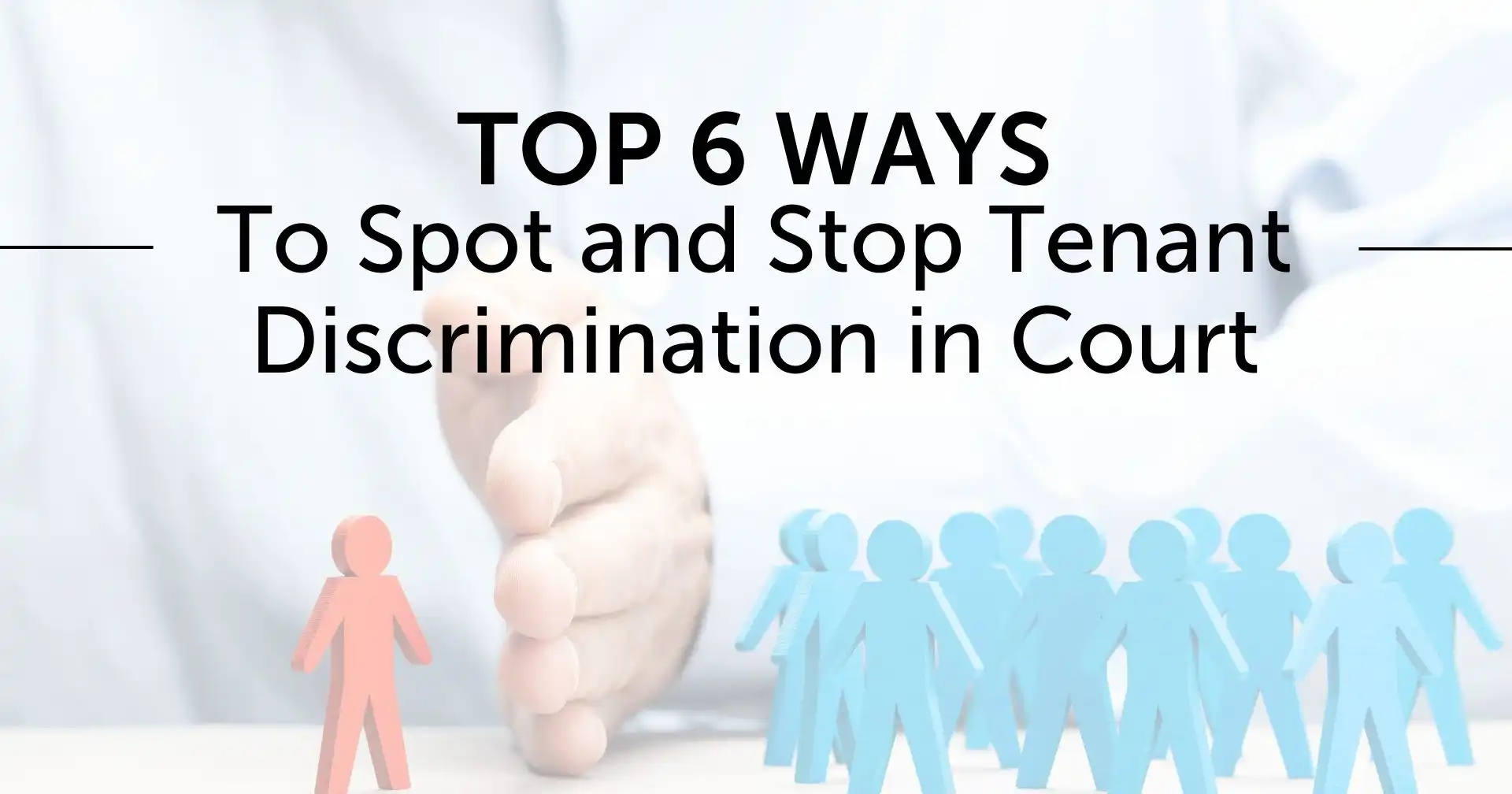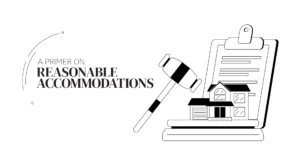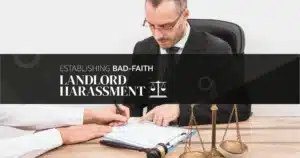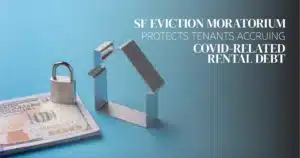You’ve found a new apartment. The rent fits your budget. The location is close to your workplace. You call the landlord. They seem excited until you mention your last name. Suddenly, the unit is “taken.”
Another landlord wants to “get to know you better.” They ask questions that feel wrong. “What’s your nationality?” “Do you plan to have kids?” Or worse: “Are you sure you will be able to afford this place?”
Later, you see someone else—different ethnicity, different gender—move in. Same unit. Same terms. Different treatment.
Tenant discrimination is illegal. But landlords still try it. They count on you not knowing your rights or feeling powerless.
This post will help. You’ll learn to spot discrimination, fight back, and protect your rights. Let’s get started.
1. What Is Tenant Discrimination
Key Signs You Face Discrimination
Tenant discrimination hides in plain sight. Watch out for these signs:
- A landlord gives confusing answers about rental units.
- They grill you on personal details like race or religion.
- Higher rents or stricter rules based on stereotypes? Red flag.
- Refusal to make disability accommodations? That’s not okay.
The Fair Housing Act (FHA) protects against unfairness. It bans discrimination based on race, color, national origin, religion, sex, family status, or disability. Knowing your rights is key.
Important Case to Know
Remember Havens Realty Corp. v. Coleman? This 1982 Supreme Court case tackled racial discrimination in housing. Two testers posed as renters to expose unfair practices. The court ruled they could sue for discrimination, even if they weren’t looking to rent.
Initially dismissed, the case got a lift from an appellate court and landed in front of the Supreme Court, which stood firm. The ruling confirmed that regardless of rent interest, anyone facing discrimination fights for their rights.
Thanks to this case, landlords think twice before playing with the rules. Discrimination, big or small, isn’t tolerated. Know these rights; they pack a punch.
2. How to Prove Discrimination Happened
Steps to Build Your Case
Do you want to prove discrimination? Evidence is your friend. Start with these steps:
- Keep detailed records. Save emails, texts, and call logs. Document rental applications and landlord responses. This info becomes your safety net.
- Use testers for backup. Have friends ask about the same unit. Compare how the landlord treats each inquiry. Differences speak volumes.
Relevant Case
Check out the Texas Department of Housing v. Inclusive Communities Project case. This 2015 Supreme Court case tackled discrimination proof under the FHA. Plaintiffs argued tax credit policies stuck affordable housing in minority neighborhoods and fueled segregation.
The court affirmed the Fifth Circuit’s ruling. Disparate impact claims are valid under the FHA. If a policy unintentionally harms a group, it’s worth investigating.
The ruling expanded ways to prove discrimination. Harm matters even if there’s no intent. Stand strong and fight for your rights.
3. Why You Need a Housing Discrimination Lawyer
When Legal Help is Critical
Some landlords push too far. A housing discrimination lawyer steps in to review your proof, file complaints, and negotiate for damages.
Case Example
Take the case of Bloch v. Frischholz. A Jewish tenant, Bloch, put a mezuzah on his door. His landlord said to take it down, claiming it broke the rules. Bloch argued this was unfair treatment based on his religion.
He filed a complaint under the FHA. Initially, the court sided with the landlord, saying the policy was neutral. But Bloch didn’t back down. He appealed to the Seventh Circuit.
The Circuit Court saw it differently. They noted that the landlord’s rule might seem neutral, but it actively discriminated against Bloch’s religious practices. Other tenants displayed items, but he couldn’t.
The court ruled in favor of Bloch, allowing him to keep the mezuzah. This case made it clear that housing rules can’t squash religious freedom. It also shows how tenants can fight back against unfair policies.
4. The Role of a Tenant Rights Attorney
Protecting Tenants from Retaliation
Landlords love to retaliate. When you stand up for your rights, they get nasty. Retaliation shows up as eviction threats, refusal to fix your place, or harassment. A tenant rights attorney makes sure this nonsense stops. They also help you get compensation for stress or losing your home.
Example Case
In Edwards v. Marin Park Inc., the tenant, Edwards, reported unfair treatment to the park management. He claimed the manager discriminated against him for his race. After his complaint, he got an eviction notice. Edwards said this eviction was revenge for speaking up.
The district court sided with the landlord. They said the eviction had valid reasons unrelated to the complaint. But Edwards took it to the Ninth Circuit. The court found clear links between the eviction and the discrimination report. They stated that punishing tenants for reporting discrimination is a big no-no.
The Ninth Circuit flipped the district court’s decision. They declared tenants are safe from retaliation under the FHA. If landlords retaliate after a tenant reports discrimination, it looks bad for them. This case stood firm on the right of tenants to speak out without fear.
5. Common Housing Discrimination Complaints
Types of Complaints You Might File
Housing disputes often pop up. Here’s the scoop. Discrimination feels wrong. Landlords may:
- Refuse to rent to certain people.
- Offer worse deals to similar applicants.
- Deny simple requests for adjustments.
- Harass tenants or their guests.
Filing complaints keeps landlords in check. Report issues to HUD or local offices.
Case Study
In United States v. Hylton, the landlord, Hylton, liked tenants without kids. Families with children got a no-go. It broke fair housing laws.
HUD stepped in after a complaint and found Hylton’s policy illegal. The court agreed. Hylton argued for business reasons, but the court was not convinced. Families with children deserve homes, too.
The court sided with the government. Hylton faced fines and penalties. A consent decree ensured future compliance. This case showed that families would get fair treatment. No one can shut the door only because a tenant has kids.
6. The Importance of Rental Discrimination Attorneys
Why Expertise Matters
Not everyone knows housing laws. Rental discrimination attorneys get it right. They help with fair housing rules. They gather proof of unfair treatment. And they represent you in court or talks.
Case Reference
Take a look at Asbury v. Brougham. Asbury, a Black tenant, applied for an apartment. He met all the requirements. But Brougham denied his application. Why? Asbury thought it was because of his race.
In court, Brougham claimed he had business reasons. Other tenants supposedly fit better. The court wasn’t buying it. Brougham showed no proof. They accepted less qualified applicants over Asbury.
The court ruled for Asbury. Brougham’s actions broke the FHA, and he had to pay damages. This case proved that legal help is crucial. It showed protections against racial discrimination. Courts must ensure everyone gets equal housing.
Stop Tenant Discrimination with Us
Tenant discrimination ruins your rights. It’s annoying, illegal, and fixable. You deserve fair treatment. The Law Firm for Tenant Rights, Inc. stands up for you.
We handle cases like yours every day. We make landlords pay for their actions. We also secure homes for those treated poorly. Our team knows fair housing laws inside and out.
When you team up with us, expect clear advice. We help you file complaints step by step. You’ll know what to expect at every turn. We don’t hold back against unfair landlords. We fight for the compensation you deserve.
Your landlord’s power ends where your rights start. Discrimination won’t control your life or options. Contact us today. Let’s join forces and battle injustice together.






